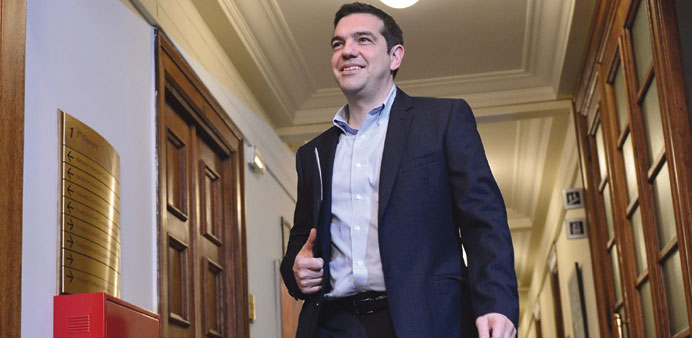Greek Prime Minister Alexis Tsipras arrives for a cabinet meeting at the Greek parliament in Athens yesterday. An enlarged team of Greek negotiators began talks yesterday with representatives of the so-called Brussels Group representing the eurozone, the International Monetary Fund and the European Central Bank to discuss which reforms Greece will turn into legislation rapidly in exchange for aid.
Reuters/Athens
Greece’s government signalled the biggest concessions so far as crunch talks with lenders on a cash-for-reforms package started in earnest yesterday, but tried to assure leftist supporters it had not abandoned its anti-austerity principles.
Prime Minister Alexis Tsipras’s three-month-old government is under growing pressure at home and abroad to reach an agreement with European and IMF lenders to avert a national bankruptcy. A new poll showed over three-quarters of Greeks feel Athens must strike a deal at any cost to stay in the euro.
An enlarged team of Greek negotiators began talks with representatives of the so-called Brussels Group representing the eurozone, the International Monetary Fund and the European Central Bank to discuss which reforms Greece will turn into legislation rapidly in exchange for aid.
The talks are expected to continue through the May Day holiday weekend until Sunday, with Tsipras willing to step in to speed things up if necessary, a Greek official said. In a sign of seriousness, both sides agreed on a news blackout, a eurozone official said.
Greece wants an interim deal by next week, hoping that will allow the ECB to ease liquidity restrictions before a €750mn payment to the IMF falls due on May 12. Athens has suggested it will struggle to pay the instalment.
Elected on promises to end austerity and scrap an unpopular EU/IMF bailout programme, Tsipras had so far refused to give ground on so-called “red lines” — pensions, labour reform and state asset sales — that are core to his leftist party’s agenda.
After a preparatory meeting of senior Greek officials on Wednesday, a top government official said Athens was willing to sell a majority stake in its two biggest ports and compromise on value-added tax rates and some pension reforms, in the clearest signal yet that it is ready to back down for a deal.
“The Greek government is ready for an honest solution which will unlock financial aid from partners and put an end to the economic asphyxiation the bailouts have caused,” Finance Minister Yanis Varoufakis, who was sidelined from the bailout talks this week to appease lenders, told Sto Kokkino radio.
However Tsipras’ office yesterday denied any climbdown, seeking to assuage hardliners in his Syriza party as he tries to satisfy Greece’s creditors before its coffers are empty.
“The government is sticking to its red lines,” an aide to the premier said on condition of anonymity. “The government does not have the popular mandate to reach a deal that crosses red lines and it won’t do that.”
Initial reaction from lenders after a dinner of senior eurozone finance ministry officials on Wednesday was non-committal. Officials said they had discussed “process and expectations” rather than substance.
“Time is going to get tight before the 11th,” one official said, referring to a crucial May 11 meeting of eurozone finance ministers.
Tsipras was expected to brief ministers on the talks at a cabinet meeting later yesterday. An omnibus bill with reforms promised to lenders is likely to be put to parliament only after cabinet approval and the conclusion of the Brussels talks.
The signals on concessions came after a senior eurozone official involved in the talks said that to secure any deal, Greece would have to make a substantial concession on at least one of three disputed issues — pensions, labour market reform and taxation.
Compounding the pressure on Athens, ratings agency Moody’s cut Greece’s credit rating deeper into junk territory late on Wednesday due to fears about whether a deal will be found in time to meet upcoming debt repayments.
The top Greek official said Athens could consider a flat VAT rate on all goods and services except drugs, foods and books and could adjust supplementary pension payouts, though it insists on not cutting those below 300 euros a month. The so-called “13th month” payment to pensioners has been a target of some eurozone finance ministers whose countries have less generous systems but are lending to Greece as part of a €240bn EU/IMF bailout.
On increasing the minimum wage — a campaign pledge by Tsipras that is strongly opposed by lenders — the official said Athens would consult with the OECD and the International Labour Organisation before taking any action, the official said.
Athens’ move to compromise comes amid growing signs that a Greek default or exit from the euro would have far less effect on the rest of the currency area than the financial chaos feared when Greece last tottered close to bankruptcy in 2012.
While Greece has seen its two-year bond yields surge to as high as 30% on fears of a default, other fragile peripheral eurozone nations have seen borrowing costs fall to record lows due to an ECB bond-buying plan.
In the latest sign that contagion from a Greek default would be limited, Spain’s economy grew at the fastest rate since 2007 in the first three months of this year, data showed yesterday.
Portugal, a fellow eurozone weakling that exited its bailout last year, has completed nearly two-thirds of its 2015 issuance needs, limiting the potential of a setback if yields rose on worries over Greece.
However, Moody’s cautioned in a report that a Greek departure could have longer-term consequences.
“The impact of a Greek exit should not be underestimated,” said Alastair Wilson, Moody’s managing director for global sovereign risk, saying the direct impact might be limited but an exit could cause a confidence shock and disrupt debt markets.

